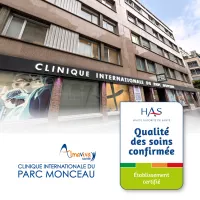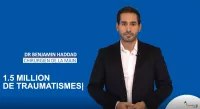COMPULSORY ADMINISTRATIVE DOCUMENTS
- Identity document: identity card or residence permit or passport.
- Up-to-date health insurance card and certificate of entitlement.
- Mutual insurance card or complementary health certificate.
- Mutuelle cover or complementary health certificate.
- Work accident or occupational illness certificate, if applicable.
- Quote from the practitioner signed by the patient.
- Quote from the clinic signed by the patient: if you are not covered by social security or if you are not covered by complementary health insurance.
MUTUELLE
The claim must be sent to the admissions department by e-mail or by fax to 01 48 88 26 16.
- Give your mutual insurance company the FINESS numbers 750300915, DMT 137 for surgery or DMT 223 for medicine.
- Mutual insurance cover is only accepted for full hospitalisation (at least one night).
COMPULSORY MEDICAL DOCUMENTS
- Informed consent given by the practitioner and signed by the patient.
- Anaesthetic consent given by the anaesthetist and signed by the patient.
- Declaration of the person in trust completed and signed by the patient and the person in trust.
PHOTOCOPIES
Photocopies do not replace the presentation of original documents.
- Double-sided identity document.
- Proof of address less than 3 months old.
- Work accident or occupational illness certificate, if applicable.
EUROPEAN UNION NATIONALS
They must present a certificate of coverage with their European health insurance card.
CMU AND AME
Beneficiaries of Couverture Maladie Universelle (CMU) or Aide Médicale d'Etat (AME) must bring with them an up-to-date certificate of entitlement proving their social security cover.
MINORS
The following administrative documents must be presented at pre-admission:
- Proof of parental authority if applicable.
- Photocopies of both parents' identity papers.
- The child's identity document, if applicable.
- Family record book.
Both parents, or in their absence the legal guardian, must sign the following
the following compulsory medical documents:
- Informed consent given by the practitioner.
- Anaesthetic consent given by the anaesthetist.
- Authorisation to operate on a minor given by the practitioner or the establishment.
The law of 4 March 2002 on patients' rights authorises the doctor to dispense with obtaining the consent of those with parental authority
if the minor objects to their consultation. In this case, the minor must be accompanied by an adult of his or her choice.
PROTECTED MINOR
When the patient is lucid, he or she must sign the mandatory documents jointly with the tutor or curator. The guardian or curator must provide proof of his or her rights over the hospitalised patient. See article L.1111 - 4 of the Public Health Code.
INJURED AT WORK
They must be in possession of the "accident at work" form issued by their employer.
NON-DISCLOSURE OF PRESENCE
You can request that your presence in the establishment not be disclosed to outside third parties by indicating this when you are admitted.











